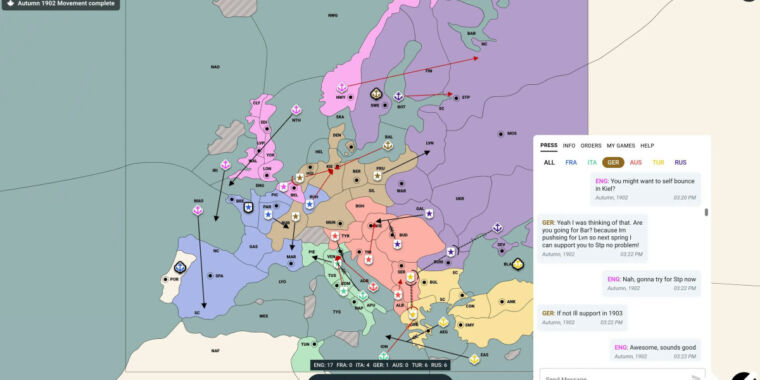The Overlords have finally arrived
Back then, all the tech people were hanging out online at a place called slashdot (/. - CLI people will understand)
Whenever a radically cool new tech popped up, there was invariably a wag that posted "I personally welcome our new X overlords"
 Join the fun!
Join the fun!This quote began in 1905 with H.G. Wells' short story "Empire of the Ants" and took on a life of its own, as the watch this Simpsons clip. The idea being that no matter how bad the end of civilization is, you can always switch sides.
For the record, I'm not worried about some sort of Artificial Intelligence hurting us or fighting us for control of the world. I never feared that. Instead, I fear it will do exactly what we want it to do. It's a much worse situation.
I've been creating content for people for a long time. One of the things it taught me is how much we're all on autopilot throughout the day. There is nothing wrong with that. In fact, it is impossible for us to think in detail all the time. So the brain forces us to dive deep enough once in a while so we don't look like a jerk.
We delve far less than we think. I think programmers are more aware of this than others because we have to do a lot.
What it all boils down to is that each person, and society as a whole, advances in knowledge and ability through chance interactions with others where both people think deeply about a problem and each no one has anything useful to offer. Some people call this a person's "luck surface". Companies have also been known to design offices to increase chance encounters, or "collisions." You can't make that kind of innovation and advancement happen. It's not just about being smarter or trying harder. Luck plays a huge role.
The Dark Ages was a time when mankind forgot to read and write, when one person, a priest, was the only person in your social life who could tell truth from fiction. The Enlightenment changed all that by reteaching literacy. People have become individually responsible for using reason and logic to try to improve their own lives. The church was very afraid of this because of the chaos they thought would result. They were right: many people who think for themselves are extremely chaotic and can even be unstable. But on the whole, they were terribly wrong. It is only through managing this chaos and instability that we have all we have today.
This new technology will take any problem and defend the side of your choice, producing paragraphs of reasonably argued prose.
This effectively means that online communication becomes something where none of us ever have to worry about chance encounters changing our understanding of the universe. Instead, whatever we need to believe, a computer can argue for us. If I take position A on something and you take position B, it's possible that we could both believe that the other person is conversing in good faith. There is a mutual exploration. It is very difficult to achieve this same group exploration remotely. Since most outsiders will never take the time to read a well-argued five-paragraph rebuttal, and a person can generate one without doing anything at all, we have effectively lost the ability to publicly discuss questions of importance. (When the AI integrates with our neural network, this will also apply to private conversations)
I think there is a future for

Back then, all the tech people were hanging out online at a place called slashdot (/. - CLI people will understand)
Whenever a radically cool new tech popped up, there was invariably a wag that posted "I personally welcome our new X overlords"
 Join the fun!
Join the fun!This quote began in 1905 with H.G. Wells' short story "Empire of the Ants" and took on a life of its own, as the watch this Simpsons clip. The idea being that no matter how bad the end of civilization is, you can always switch sides.
For the record, I'm not worried about some sort of Artificial Intelligence hurting us or fighting us for control of the world. I never feared that. Instead, I fear it will do exactly what we want it to do. It's a much worse situation.
I've been creating content for people for a long time. One of the things it taught me is how much we're all on autopilot throughout the day. There is nothing wrong with that. In fact, it is impossible for us to think in detail all the time. So the brain forces us to dive deep enough once in a while so we don't look like a jerk.
We delve far less than we think. I think programmers are more aware of this than others because we have to do a lot.
What it all boils down to is that each person, and society as a whole, advances in knowledge and ability through chance interactions with others where both people think deeply about a problem and each no one has anything useful to offer. Some people call this a person's "luck surface". Companies have also been known to design offices to increase chance encounters, or "collisions." You can't make that kind of innovation and advancement happen. It's not just about being smarter or trying harder. Luck plays a huge role.
The Dark Ages was a time when mankind forgot to read and write, when one person, a priest, was the only person in your social life who could tell truth from fiction. The Enlightenment changed all that by reteaching literacy. People have become individually responsible for using reason and logic to try to improve their own lives. The church was very afraid of this because of the chaos they thought would result. They were right: many people who think for themselves are extremely chaotic and can even be unstable. But on the whole, they were terribly wrong. It is only through managing this chaos and instability that we have all we have today.
This new technology will take any problem and defend the side of your choice, producing paragraphs of reasonably argued prose.
This effectively means that online communication becomes something where none of us ever have to worry about chance encounters changing our understanding of the universe. Instead, whatever we need to believe, a computer can argue for us. If I take position A on something and you take position B, it's possible that we could both believe that the other person is conversing in good faith. There is a mutual exploration. It is very difficult to achieve this same group exploration remotely. Since most outsiders will never take the time to read a well-argued five-paragraph rebuttal, and a person can generate one without doing anything at all, we have effectively lost the ability to publicly discuss questions of importance. (When the AI integrates with our neural network, this will also apply to private conversations)
I think there is a future for
What's Your Reaction?















![Three of ID's top PR executives quit ad firm Powerhouse [EXCLUSIVE]](https://variety.com/wp-content/uploads/2023/02/ID-PR-Logo.jpg?#)







